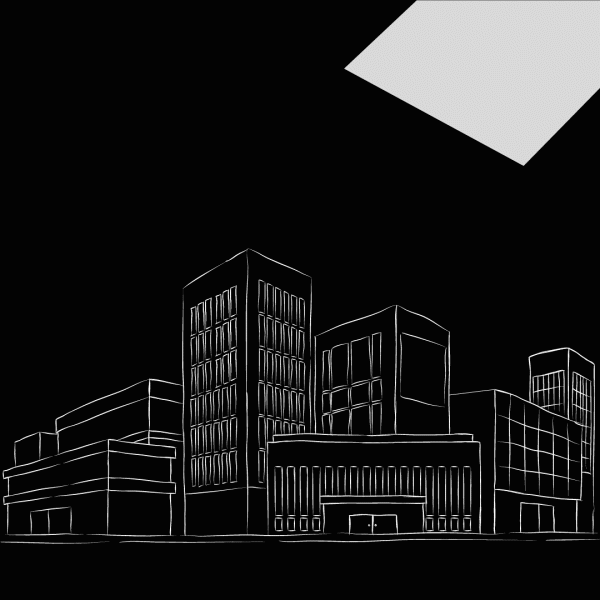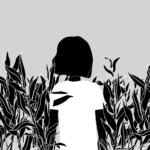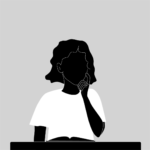THE URBAN SCREAM OF PRISHTINA
The capital of the country and the living place of hundreds of thousands of inhabitants, Prishtina, other than being mentioned in songs and political speeches, creates in me the feeling of home- the absence of which I deeply feel when I am not there. Not dependent on this status that Prishtina puts on its citizens, everyday life here is pretty challenging. The air pollution, the insane number of constructions, the destruction of houses and their replacement with massive buildings, the disappearance of public spaces are some of the words that leave a taste of chaos by just being in a sentence together, not even mentioning their co-living together in reality.

Ilustration: Argjira Kukaj
The panorama that quickly enters your mind when talking about the modern city is that of tall buildings, the high density of people who all walk indifferent towards each other and with maximal focus on their call, the noise, the traffic and the dynamics. But a city is more than that, or at least it should attempt to be. A city cannot be just plenty of streets, buildings and addresses of important institutions. Above all a city should be associated with its people and be a space dedicated to them. Up to what point is Prishtina like that?
The capital of the country and the living place of hundreds of thousands of inhabitants, Prishtina, other than being mentioned in songs and political speeches, creates in me the feeling of home- the absence of which I deeply feel when I am not there. Not dependent on this status that Prishtina puts on its citizens, everyday life here is pretty challenging. The air pollution, the insane number of constructions, the destruction of houses and their replacement with massive buildings, the disappearance of public spaces are some of the words that leave a taste of chaos by just being in a sentence together, not even mentioning their co-living together in reality.
This urban transition, which often leaves the impression of a chaotic adolescence that Prishtina is going through, reflects greatly on its inhabitants and how their social interactions shape. Through a sociological perspective, Prishtina apart from continual growth of inhabitants- especially due to migrations from other cities for school or work, offers a mosaic of lifestyles and relationships which can be illustrated through some sociological concepts. According to german sociologist, George Simmel, a city conceals social interactions behind the economic ones and every interaction within the city appears well thought, strategic and completely rational. But no matter how much a city offers the dream of freedom from traditional norms, this freedom often creates emotional and economical uncertainty, which can lead to struggles in adjusting to an urban climate
A concept very relevant now with this wave of urbanism in Prishtine, is that of the right to the city from geographer David Harvey. The severity of capitalist urbanism, especially in postwar Prishtina matches very well with Harvey’s analysis regarding the better allocation of money in urban investments, which in Prishtina are done in lack of quality and appear like a ‘jungle’. This intertwines with Edward Soja’s urban concept for urban justice, or the right to make a city by sociologist Henre Lefebvre. In this urban adventure Prishtina is a space of inequality, with concentric circles where the center is occupied by the rich in the same way that the suburbs- with luxurious neighborhoods with fences, with lots of streets to shorten the journeys of these neighborhood’s people, while in between the center and the suburbs, remain under-developed. In Prishtine we see a scary gentrification and an abnormal growth of shopping malls, buildings that only look pretty in the covering advert of the construction site and of private properties. More than ever consumerism is being promoted as a norm and social interactions are being monetized, which keep the poor and the marginalized away from the public, now private.
Therefore the call to recognize these concepts, in the same time to also practice them goes beyond the idea of activism. Nowadays that has to do with the sense of home, feeling that is being threatened. Prishtina shouldn’t be deprived of a spirit because of urban development that is done without critique and reflection. Prishtina should be co-constructed , fixed or changed, but all this should come from the voice of the citizens, whom should consider this cause as theirs and should work towards this beyond election times.
About the author: Trina Hoti, 20 years old from Prishtina, is a sociology student at the Faculty of Philosophy at the University of Prishtina.
This grant is supported by the Balkan Trust for Democracy, a project of the German Marshall Fund of the United States



Pretty nice post. I just stumbled upon your weblog and wanted to say that Ive truly enjoyed browsing your blog posts. In any case I’ll be subscribing to your rss feed and I hope you write again very soon!